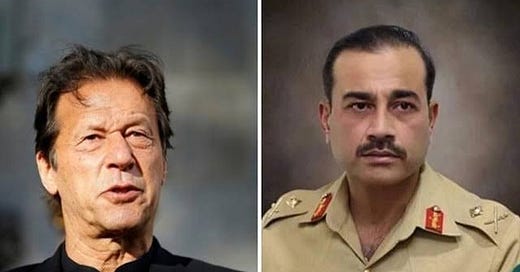All set for a collision
Now that Imran is seen to be using every new opportunity to burn rather than build bridges, the determination to restrain and chain him further will grow.
The current political situation is fraught. It can explode at a touch. That might not mean a thing in a country whose rulers carpet-bomb sanity every-day. But considering how high power games stakes have become, and how direct is the confrontation between the PTI and the General Asim Munir-led Establishment, our seedy national history can’t be the cause to ignore the possible scenarios that might lie ahead.
For now, the Establishment is bleeding at the nose. The Cypher Case acquittal of both Imran and Shah Mehmood Qureshi (who, one must admit, has outlived his general reputation of being a wordy wimpy political wonk and has emerged as a resilient stalwart by braving the jail for many months) is a direct hit in the face.
After all this was the crown jewel in the cluster of cases meant to hold Imran to account. This was where all of Imran’s most egregious deeds coalesced to attack the army leadership. It was the point at which he crossed the ultimate redline to accuse the army leaders of conspiring with the USA to oust him from power so that the Pakistani nation could be kept as a “slave”. This was also the beginning of the campaign that culminated in the 9th May tragedy and the burning of the corps commander’s house in Lahore, among other acts of grim violence. Also, Imran is using the same cypher framework to warn the world, through an X reminder that pops up regularly on his account, that his potential murder accused would be the present army chief.
Said in another way, without the Cypher drama Imran had no game going. So, it was vital to pull this flying rug from underneath his feet and cause him to fatally crash. The court, led by a chief justice who has been lampooned by the PTI consistently, however has now dented the Cypher Case badly, picking holes in it that did not even exist. (For instance, asking questions about the Cypher’s veracity and raising doubts about whether losing and politically abusing a classified document is even a marginal offence much less a grave violation of the official secrets act etc). The government would appeal the acquittal of both jailed leaders but the mood in the Supreme Court too is no different from the mood elsewhere in the judiciary—that is of pushing back the Establishment and making it look weak by pouring hot scorn over any case that is pursued in the name of threat to national security.
Ideally, the PTI should have used its new-found space and support from the judges, (who in the past have been keen on playing the Establishment’s handmaidens in battering out-of-favour politicians careers) to its long-term advantage in negotiating a political settlement with other political parties including those in the government. But instead of making that outreach, it has stymied itself by insisting that it would not engage with a “fake government” that has “stolen its mandate.” Further, it has deepened its wedge with the Establishment with its pointless but popular campaign of comparing the 1971’s creation of Bangladesh with the present situation and dittoing the role of the morally bankrupt drunkard General Yahya in that crisis with General Asim Munir’s handling of the situation in the present-day Pakistan. That specious argument that the comparison is just political has no value because it is evident what Imran Khan is saying to the army: you broke up the country, and you are no different from the wretched men of the past—a selective and incomplete case but one that resonates at the popular level.
This has inflicted a deep injury onto an already bruised institutional pride. The PTI campaign reopens disturbing memories including those of the loss of a war at the hands of India, the arch enemy. This takes the sense of our outrage in Establishment circles beyond the current army leadership as the 1971 debacle wasn’t the act of an individual. Nor was it an instant calamity that exploded in a year. In fact, its formative phase was defined by General Ayub Khan whose grandson, Umar Ayub, is PTI’s leader of the opposition in the National Assembly.
So be informed: the current controversy over Hamood ur Rehman report a real disaster for PTI’s otherwise hopeful signs of recovery from a tight and injurious political phase. The Establishment—and there will always be an Establishment, regardless of whether you have a French Revolution, or a Russian Revolution or an Iranian Revolution or a so-called Arab Spring—has been clearly not keen on letting Imran out of jail and conducting himself in the public realm. But now that he is seen to be using every new opportunity to burn rather than build bridges, the determination to restrain and chain him further will grow.
Imran thinks he is close to becoming free, courtesy the courts, and therefore he can headbutt the generals more. The generals see this behaviour as the ultimate endorsement of their worst view of him as a dark force of chaos, revenge and disruption. This sets them both on a collision course, straight and head-on. And they are galloping on the path headlong.





What an analysis. You have provided a very sharp analysis. The role of the judiciary establishment versus Imran. What a pivotal moment! IK is accusing everyone in the system, creating violence using every tactic to provoke tension. The escalating tension between Imran and the military is setting the stage for a potential confrontation.
not certain. Imran needs to vanish now. His time is long gone and there are no decent intelligent people in his party. The cipher case should have nailed him? that moment is gone. He is a public nuisance and of no value to the nation. But remember at his age this is the only game in town for him.